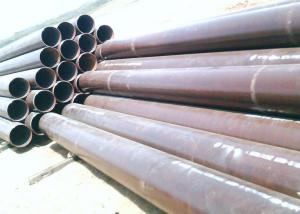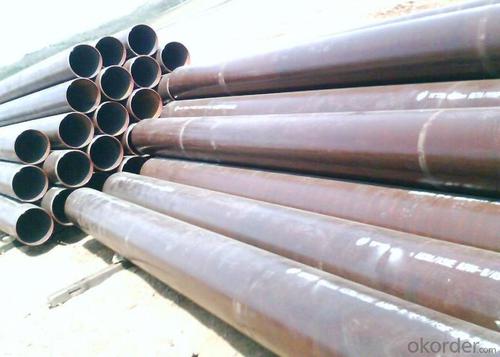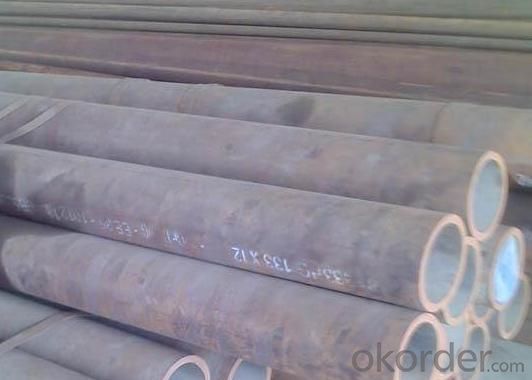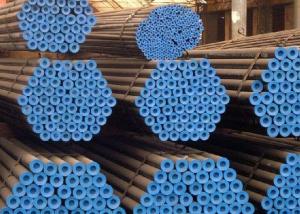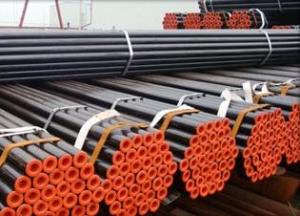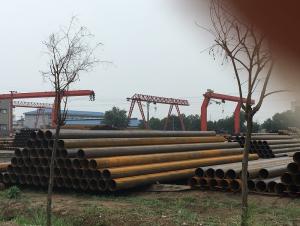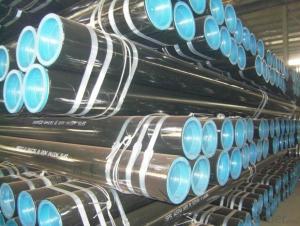Tube For Hydraulic Pillar Service Grade 45# Seamless Steel Pipe
- Loading Port:
- China Main Port
- Payment Terms:
- TT or LC
- Min Order Qty:
- Negotiable m.t.
- Supply Capability:
- 5000 Tons Per Month m.t./month
OKorder Service Pledge
OKorder Financial Service
You Might Also Like
Seamless Steel Pipe
Specifications of Tube For Hydraulic Pillar Service Grade 45# Seamless Steel Pipe
Outside Diameter | 1/2''---24'' |
Wall Thickness | SCH5 ------SXH XXS |
Standard | API and ISO |
Material | 10# 20# 45# Q235 Q195 Q345 |
Origin | China |
Certificate | API5L ISO9000 API 5CT |
Technique | hot rolled |
application | use for oil well, boilers, precision machines, petro-chemical, ship, structure pipe, building, fluid tubes, line pipe etc |
Testing | we have professional testing equipments such as ultrasonic testing machine, eddy current testing machine, mechanics testing machine to make sure high quality |
Tolerance: | WT TOLERANCE-5%+5% |
Min Order | 5 TON |
Usage | Petroleum and natural gas industry, chemical industry, electric industry, flammable and non-flammable liquid transportation and steel construction, drainage project and city construction etc. |
Package | in bulk , in bundle, standard seaworthy package |
Length | 1-12M |
Delivery time | 15-20 days after received the advanced payment |
Packing | Black paint or varnish ,plastic caps with the both ends |
Reference Standard Tube For Hydraulic Pillar Service Grade 45# Seamless Steel Pipe
Chinese Standard |
American Standard |
German Standard | |||
10# |
A53-A |
St37 |
DIN1626 | ||
A106-A |
St37-2 |
DIN17175 | |||
A179-C |
St35-8 |
DIN17175 | |||
20# |
ASTM A106-B |
St45-8 |
DIN17175 | ||
ASTM A53-B |
St42-2 |
DIN1626 | |||
ASTM 178-C |
St45-4 |
DIN1629/4 | |||
45# |
ASTM A 1045 |
CK45 | |||
16Mn |
A210-C |
St52 |
DIN1629/3 | ||
St52.4 |
DIN1629/4 | ||||
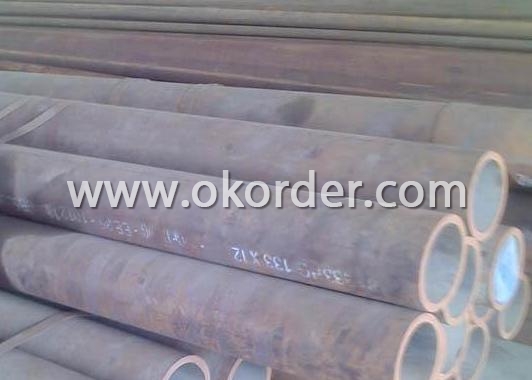
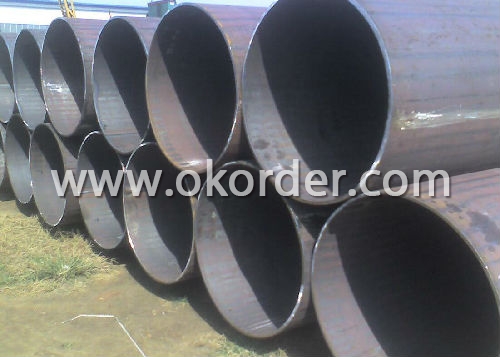
- Q: What is the standard length of steel pipes?
- The standard length of steel pipes varies depending on the industry and application, but common lengths range from 10 to 40 feet.
- Q: What is the difference between internal and external coating of steel pipes?
- The main difference between internal and external coating of steel pipes lies in the purpose and location of the coatings. The internal coating is applied on the inner surface of the steel pipe to protect it from corrosion and ensure smooth flow of the contents within the pipe. It is commonly used to prevent contamination of the transported liquid or gas and to extend the lifespan of the pipe. On the other hand, the external coating is applied on the outer surface of the steel pipe to protect it from environmental factors such as moisture, chemicals, and physical damage. It helps to prevent corrosion and maintain the structural integrity of the pipe, especially in harsh conditions. Overall, while the internal coating focuses on the functionality and preservation of the transported contents, the external coating primarily aims at safeguarding the pipe itself from external influences.
- Q: Can steel pipes be used for conveying potable water?
- Yes, steel pipes can be used for conveying potable water. However, it is important to ensure that the steel pipes are coated or lined with suitable materials to prevent corrosion and contamination of the water supply. Regular maintenance and monitoring of the pipes are also necessary to ensure the water remains safe for consumption.
- Q: How are steel pipes used in the textile industry?
- Steel pipes are used in the textile industry for various purposes, including the transportation of water, steam, and chemicals, as well as for the distribution of compressed air. They are also used in the construction of machinery and equipment, such as dyeing machines and fabric stretching frames. Additionally, steel pipes are utilized for the installation of heating and cooling systems in textile factories.
- Q: How are steel pipes used in the construction of irrigation systems?
- Steel pipes are commonly used in the construction of irrigation systems due to their strength and durability. These pipes are used to transport water from a water source, such as a well or reservoir, to the desired areas for irrigation. They are often used in underground or above-ground applications, providing a reliable and efficient means of delivering water to crops or plants. Steel pipes are resistant to corrosion and can withstand high pressure, making them ideal for irrigation systems that require long-term functionality.
- Q: What is the role of steel pipes in the transportation of water?
- Steel pipes are of utmost importance in the transportation of water due to their durability and strength. They find extensive use in diverse water supply systems, including municipal water distribution networks, irrigation systems, and industrial water transportation. One of the primary benefits of steel pipes lies in their capacity to endure high pressure and deliver water reliably over long distances. The strength of steel enables the construction of pipelines with larger diameters, facilitating the efficient movement of substantial water volumes. Additionally, steel pipes exhibit remarkable resistance to corrosion, a critical characteristic when conveying water that may contain different minerals, chemicals, or contaminants. The corrosion-resistant properties of steel pipes ensure that the water quality remains uncompromised throughout the transportation process. Furthermore, steel pipes offer exceptional structural integrity, rendering them suitable for both underground and above-ground installations. They can withstand extreme weather conditions, seismic activity, and heavy loads, thereby ensuring the longevity and dependability of the water transportation system. Moreover, steel pipes are easy to install and maintain, apart from being robust and durable. They can be seamlessly welded together, resulting in a pipeline with minimal leakage points. Regular inspections and maintenance help identify potential issues or damages, guaranteeing an uninterrupted flow of water. In conclusion, steel pipes play a critical role in water transportation, serving as a strong and reliable conduit. Their ability to withstand high pressure, resist corrosion, and maintain water quality make them an ideal choice for various water supply systems, contributing to the efficient and sustainable distribution of water resources.
- Q: How are steel pipes used in the manufacturing of geothermal systems?
- Steel pipes are used in the manufacturing of geothermal systems primarily for their strength, durability, and resistance to corrosion. These pipes are used to transport fluid, typically water or a water-based solution, from the geothermal source to the surface, where it can be utilized for heating or electricity generation. The high tensile strength of steel pipes allows them to withstand the high pressure and temperature conditions typically found in geothermal systems. Additionally, steel pipes are resistant to corrosion, which is important in preventing leaks and maintaining the efficiency of the system over its lifespan.
- Q: How are steel pipes used in bridge construction?
- Steel pipes are commonly used in bridge construction as structural elements to provide support and stability. They are often used as piers, piles, or columns to bear the weight of the bridge and transfer it to the ground. Steel pipes are also utilized in the construction of bridge decks and railings. Their strength, durability, and versatility make them essential components in bridge engineering.
- Q: What are the different methods of protecting steel pipes from corrosion?
- There are several methods of protecting steel pipes from corrosion. One common method is coating the pipes with materials such as epoxy, polyethylene, or fusion bonded epoxy, which create a barrier between the pipe's surface and corrosive elements. Another method is cathodic protection, which involves using sacrificial anodes or impressed current to prevent corrosion. Additionally, applying corrosion inhibitors or using corrosion-resistant alloys for manufacturing the pipes can provide protection. Regular maintenance, including inspections and cleaning, is also crucial to ensure the ongoing protection of steel pipes from corrosion.
- Q: How are steel pipes protected against soil movement or settlement?
- Various methods can be employed to safeguard steel pipes against soil movement or settlement. One prevalent approach involves the utilization of protective coatings on the pipes, which act as a barrier between the steel and the soil. By preventing direct contact and reducing the chance of corrosion, these coatings offer effective protection. Epoxy, polyethylene, and zinc are among the coatings commonly employed for this purpose. Another method entails the implementation of cathodic protection. This technique involves the installation of sacrificial anodes along the pipeline. These anodes corrode instead of the steel pipes, thus shielding them from potential harm caused by soil movement or settlement. Furthermore, ensuring proper design and installation techniques is crucial for protecting steel pipes in these scenarios. Engineers must take into account factors such as soil composition, slope stability, and the likelihood of ground movement when designing the pipeline route. Additionally, employing appropriate trenching and bedding techniques guarantees adequate support and protection against settlement. Regular inspection and maintenance play a crucial role in protecting steel pipes against soil movement or settlement. By monitoring the condition of the pipeline, including the protective coatings and cathodic protection systems, potential issues can be identified promptly, allowing for timely repairs or replacements. In conclusion, a combination of protective coatings, cathodic protection, proper design and installation techniques, and regular maintenance effectively safeguards steel pipes from soil movement or settlement.
1. Manufacturer Overview
| Location | Henan, China |
| Year Established | 2001 |
| Annual Output Value | 800,000Tons |
| Main Markets | Europe and the United States; Canada; India; South etc. |
| Company Certifications | API 5L; API 5CT; GB/T19001-2000 idt ISO9001:2000 |
2. Manufacturer Certificates
| a) Certification Name | |
| Range | |
| Reference | |
| Validity Period |
3. Manufacturer Capability
| a) Trade Capacity | |
| Nearest Port | Qingdao; Lianyungang |
| Export Percentage | 50% - 60% |
| No.of Employees in Trade Department | 1000-1100 People |
| Language Spoken: | English; Chinese; Spanish |
| b) Factory Information | |
| Factory Size: | Above 423,000 square meters |
| No. of Production Lines | Above 10 |
| Contract Manufacturing | OEM Service Offered; Design Service Offered |
| Product Price Range | Average |
Send your message to us
Tube For Hydraulic Pillar Service Grade 45# Seamless Steel Pipe
- Loading Port:
- China Main Port
- Payment Terms:
- TT or LC
- Min Order Qty:
- Negotiable m.t.
- Supply Capability:
- 5000 Tons Per Month m.t./month
OKorder Service Pledge
OKorder Financial Service
Similar products
Hot products
Hot Searches
Related keywords
